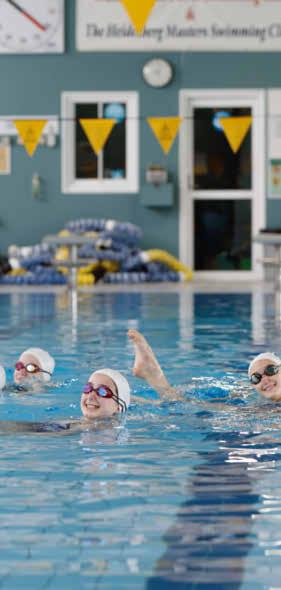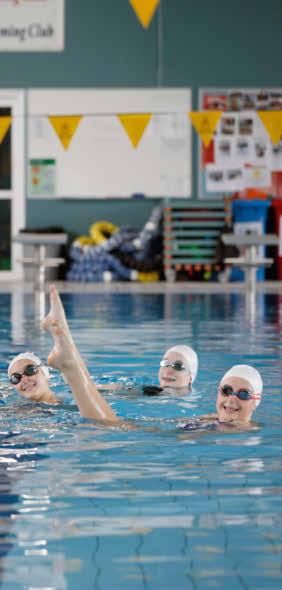
5 minute read
St Michael’s Grammar School
Principal HEAD OF SCHOOL Terrie Jones
Commencing as Head of the School in 2018, Mrs Terrie Jones’ experience in educational leadership complements a demonstrated track record in developing innovative, evidencebased curriculum that translates into meaningful student outcomes. 25 Chapel Street, St Kilda VIC 3182
Advertisement
St Michael’s is one of Australia’s leading independent coeducational schools, educating more than 1200 students from Kindergarten to VCE.
Educational excellence matters at St Michael’s. We prepare young people to flourish in the contemporary context, and enable them to build the skills and develop the personal qualities that will serve them throughout their lives. St Michael’s staff members are committed to exercising and extending each student’s capacity for critical thinking, autonomous learning, problem-solving and collaboration.
Our rich and diverse curriculum and co-curricular programs challenge students while facilitating their individual growth. We encourage students to develop their identity as learners and work alongside them to pave their way to the destinations they wish to embrace beyond school.
We have the advantage of being a K-12 school on one site in St Kilda. Our location provides a vast array of opportunities to learn from and with the creative, academic, not-for-profit and business communities for the betterment of the world. Students perform, exhibit, play sport and learn in some of Melbourne’s most iconic, creative and professional spaces.
Our welcoming and supportive environment enables each student to develop a strong sense of their gifts and to instil a purpose that will imbue their life with meaning.
THE BASICS
Enquiries
+61 3 8530 3310 stmichaels.vic.edu.au enrolments@stmichaels.vic. edu.au
Years
3-Year-Old Kindergarten – Year 12
Denomination
Anglican
Gender
Co-educational
Fees
$20,221 (Kindergarten) – $32,535 (Year 12)
Boarding \ No
Scholarships \ Yes
* Results are provided by the school, Domain does not warrant their accuracy
K-12 EDUCATION
We have evolved our approach to teaching, learning and caring, building on our strengths as a Kindergarten to Year 12 school on one campus. We offer students greater support, detailed guidance, and increased diversity of opportunities.
EXCELLENCE
Each student’s holistic development is our central concern. We strive for personal excellence in all learning areas, providing students with clear expectations and skilled instruction while inspiring curiosity, motivation and confidence.
WELLBEING
A focus on positive, respectful relationships and trust gives life to the school’s core values of dignity, respect, care and compassion, which are enacted daily in the quality of rapport that students enjoy with their peers and staff.
CO-EDUCATIONAL
Learning together as equals, girls and boys develop a shared appreciation and acceptance of each other. Our students encounter a range of approaches to learning, personalities and perspectives, underpinning our commitment to inclusion.
FINDING PASSION AND PURPOSE
Engaging in co-curricular activities and clubs has a multitude of benefits.
BY JOANNE BROOKFIELD
BEYOND THE CLASSROOM
The late British educationist and creativity expert, Sir Ken Robinson, defined in his book The Element a particular point at which natural talent meets personal passion, leading in turn to achievement at the highest levels.
“It’s a fantastic book that talks about how finding your passion really helps you find yourself,” says Ivanhoe Girls’ Grammar School’s head of senior school and deputy principal Davina McClure. “I think students do find their element when they have that choice of being involved in a co-curricular activity.”
At Ivanhoe, there are more than 30 clubs and activities available to students, in addition to performing arts groups and sports teams.
“We have more than 20 ensembles that include choirs, chamber groups, orchestras and bands,” she says.
As part of Girls Schools Victoria (GSV), Ivanhoe’s students have the opportunity to compete in week-day inter-school sports that include softball, badminton, volleyball, indoor cricket and hockey, with the school also offering its own sports program, which takes in different experiences like circuit training, aerobics and fencing. Those who might not be athletically inclined also have a range of other options, from areas as diverse as coding and chess, to gardening and knitting.
“Co-curricular activities are significant for enriching students on an emotional, cognitive, physical, and social level,” says Megan Fritsch.
As president of the Career Industry Council of Australia, Fritsch knows the value of such activities when it comes time for students to enter the workforce.
“The rewards of co-curricular activities in schools have been researched pretty well and it is now ascertained that students who participate in these activities show better academic results, stronger relationships in schools and are more likely to lead a healthy and active lifestyle,” she says.

“Experiences and skills acquired through these co-curricular activities make students proactive and prepared for their future endeavours,” she adds, which is why they are so appealing to employers when they see them on CVs.
For former Wesley College student Caity Price, this was certainly her experience. Now 24, she is working at the Australian Securities and Investments Commission as a market surveillance analyst, having graduated with arts/law degrees and been admitted as a solicitor by the Supreme Court of Victoria. While attending Wesley from kindergarten through to year 12, she played violin in the orchestra and was on the school’s softball and skiing teams.
Discovering a passion for these sports, she also joined clubs outside of school, which opened up further social and travel opportunities. It also helped her transition into tertiary education.
“Especially at uni, I played a lot of softball, and went to UniGames, which enabled me to get involved in campus life in ways I otherwise wouldn’t have,” she says. This included founding a softball club, which led to her sitting as a board member on ANU Sport.
Looking back now, she can see so many other benefits that set her up for success. Not only did playing sports teach her about “hard work, diligence and empathy in understanding people from different backgrounds”, she says she also acquired a suite of professional skills such as “managing people, following through with a strategic purpose, creating both long and short term direction of an entity, managing logistics and finances”.

